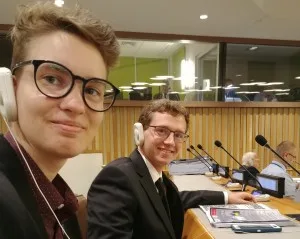News
MBC Alumni Share Insights at UN

By Doug Karlson, Director of Communications
On Wednesday, two of SEA Semester’s most recent alumni, Cecilia Howard (Johns Hopkins University) and Andrew Meashaw (SUNY College of Environmental Science & Forestry), who sailed this spring on the Marine Biodiversity & Conservation Program (C-285), joined their professors, Dr. Kerry Whittaker and Dr. Porter Hoagland, to serve on a panel and make a presentation at a meeting of the Decade of Ocean Science for Sustainable Development at the United Nations in New York.
Andrew and Cecilia made a presentation on their study of biodiversity in remote high seas regions, including their program’s collaboration with the Woods Hole Oceanographic Institution’s Ocean Twilight Zone Project. Cecilia and Andrew also served on a panel of other ocean experts to discuss new technologies and approaches for ocean ecosystem management.
The event was moderated by Kristina Gjerde of the International Union for the Conservation of Nature and Dr. Harriet Harden Davies of the University of Wollongong and the Deep Ocean Stewardship Initiative and focused on new technology to study the ocean’s mesopelagic or twilight zone, and how to better understand and connect with remote parts of the ocean.
“This provided an amazing opportunity to share the work we did at SEA with the world. We discussed the importance of programs such as SEA in spreading ocean literacy to a broad audience, and how our research has been able to support WHOI’s work, particularly with the Ocean Twilight Zone project,” said Cecilia.
Andrew agrees. “The chance to watch and be part of the world wide effort to understand and sustainably use the ocean was eye opening. Being able to talk at the UN was an amazing opportunity to show the world why programs that give you experience and knowledge like SEA does is so important. The world governments have now seen that SEA and its partnership with WHOI are powerful tools for expanding people’s knowledge about the ocean and this hopefully will begin to be replicated around the world.”
“Andrew and Cecilia presented their SEA experience as a shining example of how partnerships between educational and scientific institutions can help expand our scientific understanding of the deep ocean and build ocean literacy. Their contribution to this UN event will inform ongoing discussions,” said Dr. Whittaker.
Cecilia and Andrew also attended the UN’s morning plenary session which Cecilia said was a great opportunity to see what others around the world are doing with regards to ocean science and policy.
“Our presentation and the panel as a whole were well-received by the delegates and other individuals attending the event, and I hope that they are able to take our words into account as they move forward with their work on ocean sustainability,” said Cecilia.
“SEA’s programs for science and education provide a model for building a society of critical thinkers and ocean stewards. This event offered an exciting opportunity for SEA to share expertise and passion for ocean science and stewardship with the international community,” said Dr. Whittaker.
Dr. Hoagland noted that the event allowed both students and faculty the opportunity to meet with individuals who are at the forefront of shaping international marine science policy, including Craig McLean, NOAA acting chief scientist, and Marc Porter, W-141, of the U.S. State Department, as well as officials from the International Atomic Energy Agency, OceanX, OceanCare, the European Union and Norway.
Also presenting at the event were Drs. Annette Govindarajan and Paul Caiger, of Woods Hole Oceanographic Institution, who spoke about the Ocean Twilight Zone, and Dr. Randi Rotjan, of Boston University, who spoke about making marine science and exploration more accessible.
Contact: Douglas Karlson, Director of Communications | 508-444-1918 | dkarlson@sea.edu | www.sea.edu